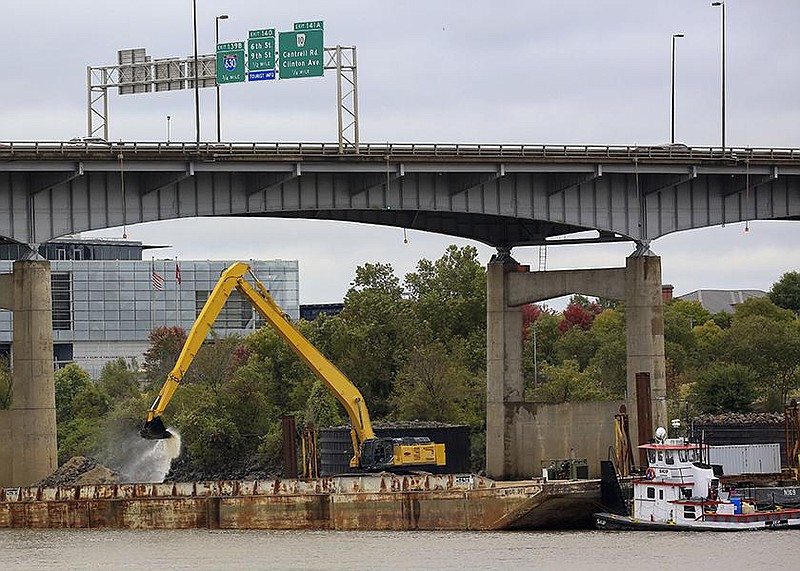A Pulaski County circuit judge on Wednesday refused to stop work on a construction project on Interstate 30 through downtown Little Rock and North Little Rock, ruling that plaintiffs behind a lawsuit questioning whether the state can pay for the project do not have evidence to justify halting construction.
The plaintiffs had asked for Judge Mackie Pierce for a preliminary injunction to stop work on the project, dubbed 30 Crossing, until their lawsuit can be decided at trial.
"The case law is clear that I am to deny this extraordinary remedy," Pierce said. "I just do not see how a preliminary injunction is appropriate. There is no showing of irreparable harm."
All the plaintiffs have to offer is speculation and "words of uncertainty," but no hard evidence that they're being harmed in a manner that would justify a preliminary injunction, Pierce said.
The judge also cast doubt on whether the plaintiffs can win their 3-week-old suit. Their next move will be defending the litigation against a motion to dismiss from state lawyers.
The plaintiffs are a coalition of downtown Little Rock neighborhoods and residents who oppose the project. They are suing the Arkansas Department of Transportation and its director, Lorie Tudor, to force an accounting of how the agency will pay for the 6.7-mile corridor through downtown Little Rock and a companion project in Saline County.
The group demands the department show how the work will be paid for given an October ruling by the Arkansas Supreme Court that restricts use of a highway-repair fund generated by a statewide sales tax.
The group contends the high-court ruling eliminates a substantial income stream that highway builders were relying on to back the project, a claim that state lawyers say is "wrong" and based on a "misinterpretation" of that ruling.
In response to the lawsuit, agency officials said the Transportation Department is using a mix of federal money and regular state matching funds to pay for the multiphase project, which is ultimately expected to cost in excess of $1 billion. The first phase of the project is underway now with a $632 million price tag.
The first phase is centered on a new Arkansas River bridge. It will feature three through lanes, two-collector-distributor lanes and an auxiliary lane in both directions. In Little Rock, the phase will include a new I-30/Cantrell Road interchange. Removal of the cloverleaf ramps of the existing interchange will leave 18 acres available for a park or other public space.
In North Little Rock, the phase will include a new interchange at Broadway and improvements to I-30 from there to Interstate 40.
Work that is starting this month includes construction on Mahlon Martin Street, the east frontage road between East Sixth Street and the Cantrell Road interchange and the west frontage road entrance ramp at the University of Arkansas at Little Rock William H. Bowen School of Law.
On I-30 itself, work will begin to remove the center median on the North Little Rock side.
Pierce's decision Wednesday came after a 2½-hour hearing centered on the testimony of two of the plaintiffs, both economists living downtown, John Hedrick and Dale Pekar.
The men had analyzed the department's spending plans, telling the judge the project, already with a ballooning price tag, would cost even more if the state runs out of money mid-project. That would require construction to be halted until the state can come up with the funds to pay for further work, they said. Such a delay could inflict significant grief and inconvenience on travelers if, for example, the I-30 river bridge were torn down before the state could pay for its replacement, they said.
Plaintiffs attorney Richard Mays said the state can't pay for the project if the Transportation Department can't tap Connecting Arkansas Program money, the highway construction fund paid for by a sales tax approved by voters in 2012. The lawsuit is premised on the October Supreme Court ruling that those funds cannot be used on highways wider than four lanes.
Opposing the call for the work stoppage, attorney Rita Looney, Transportation Department chief counsel, told the judge that Mays is "just plain wrong" about the meaning of the high-court decision. All the plaintiffs can do is speculate about funding issues without showing proof any problems actually exist, she said, telling the judge the department has the resources to fully pay for the work. Looney said there are numerous grounds for the judge to throw out the suit and that her next move will be a motion to dismiss the case.
The plaintiffs include the Little Rock Downtown Neighborhood Association, the Pettaway Neighborhood Association, the Hanger Hills Neighborhood Association, the Forest Hills Neighborhood Association, the Coalition of Little Rock Neighborhoods and the Arkansas Communities Organization. The individual plaintiffs are Barbara Barrows; state Rep. Denise Ennett; recent City Council candidate Rohn Muse; law professor Joshua Silverstein; and community activist Kathy Wells, president of the Little Rock neighborhood coalition.
Information for this article was contributed by Noel Oman of the Arkansas Democrat-Gazette.
